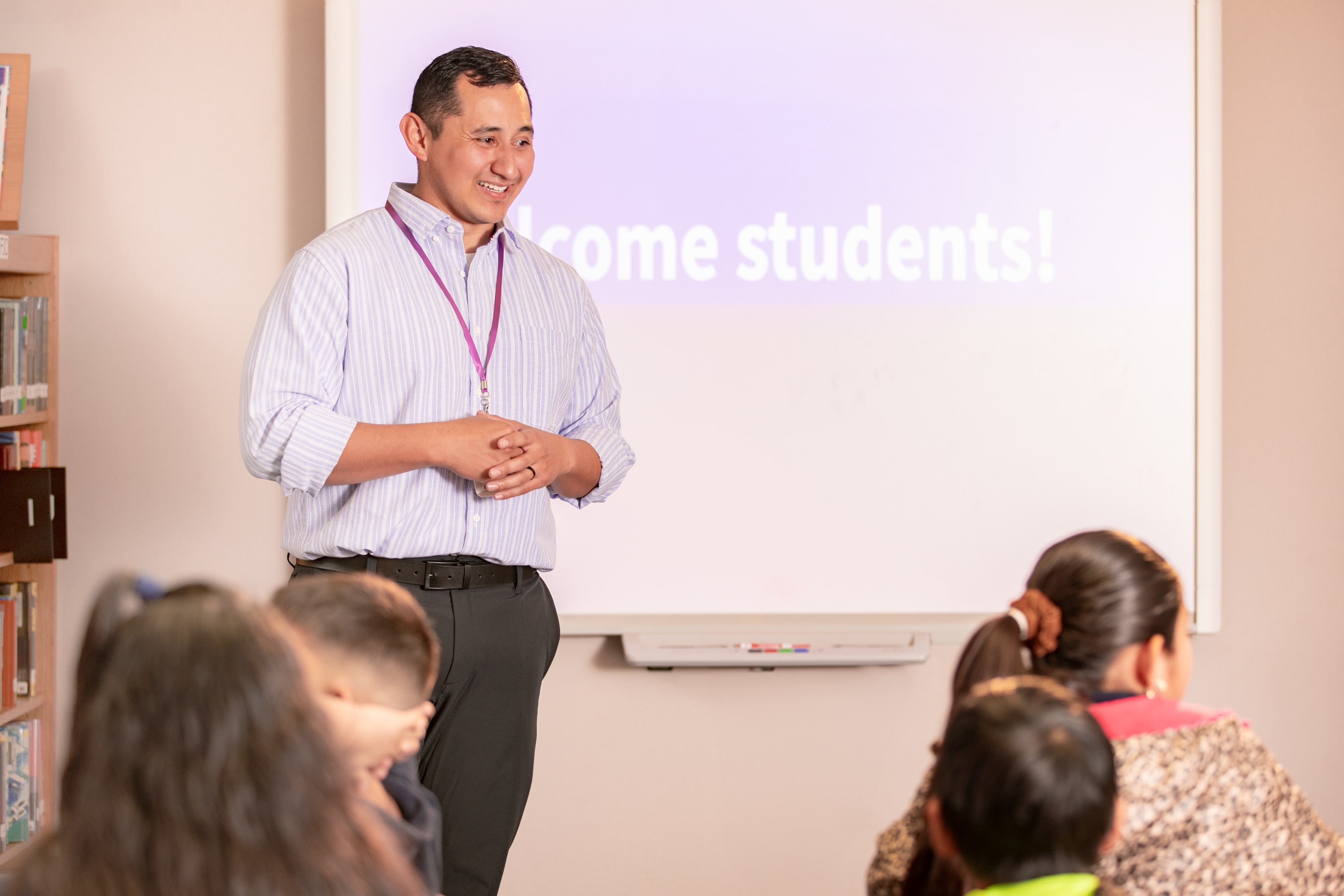Teaching and Education Master’s Programs
Advance Your Teaching Knowledge
The education master’s programs at GCU offer an opportunity for those with a calling to education to either advance their knowledge or begin their journey toward licensure. Our advanced programs for continuing education are designed to teach current educators new skills and innovative teaching methods to help you increase your professional marketability and position yourself for potential leadership and advancement opportunities. We also offer graduate programs if you are interested in teaching at the postsecondary level at a two- or four-year institution. (Note: many four-year colleges and universities require educators to have a doctoral degree.)
For those who already have a degree in a field other than education, but are seeking licensure, we have initial programs that lead to licensure and programs that do not lead to licensure. Those who decide to pursue a non-licensing program have typically earned their licensing after completing their bachelor’s program. In both pathways, you have the opportunity to gain a rich foundation in learning, leading and serving from our College of Education.
AAQEP-Accredited Teaching Degrees

Many of GCU’s education master’s programs have attained accreditation from the Association for Advancing Quality in Educator Preparation (AAQEP). The College of Education and the AAQEP aim to strengthen teacher preparation programs and professional development through rigorous curriculum standards and hands-on experiences while upholding their commitment to excellence and meeting educational standards.
GCU is institutionally accredited by the Higher Learning Commission (HLC). This credential reflects our commitment to providing a quality education to our students. Since 1968, the HLC has granted accreditation to GCU, acknowledging that it meets the criteria and standards established by the organization.
Loading Form
Online Master of Education Programs◊◊
Master’s in Education Degree FAQs
Our frequently asked questions are designed to offer you insights into pursuing your graduate studies and strategizing your career path in the field of academia.

GCU offers both initial teacher licensure (ITL) and non-licensure programs (NITL) in a variety of specializations so you can prepare to teach students in areas such as special education, early childhood education, elementary or secondary education.
Initial Teacher Licensure Programs
GCU’s Initial Teacher Licensure (ITL) programs are tailored for master's degree students seeking preparation for the classroom. These programs teach a comprehensive curriculum covering pedagogy, classroom management and in-depth subject-specific knowledge. Through coursework and hands-on teaching experiences, you will have the opportunity to develop the skills and confidence needed to become an effective educator. An initial licensure program may be ideal for those looking to transition into teaching or aiming to enhance their career prospects by working toward obtaining teaching credentials. Online education master’s programs that lead to licensure will include a student teaching experience toward the end of the program, which is needed to seek certification.
Find a Non-Licensure Program for Your Goals
The non-licensure education programs offered at GCU are designed for individuals who are passionate about education but are not seeking teacher certification. These programs delve deep into educational theory, research and practice, providing valuable insights into the field without the licensure requirement. The non-licensure version of master's in teaching programs at GCU are shorter in duration than ITL programs as it does not include the approximately 15- to 16-week student teaching component. The non-licensure programs may be ideal for education professionals to position themselves for possible career advancement, educators exploring specialized areas, or individuals passionate about impacting education without pursuing traditional certification.
GGU’s Master of Education programs¬
If you're exploring options for advancing your career through higher education, you might find interest in GCU's master’s in teaching programs. Designed for current educators who are looking to take the next step in their careers, explore programs in areas like curriculum and instruction, educational administration, instructional technology and more.
Master’s in Teaching Options for Current Educators
These programs offer further learning and skill development beyond traditional academic degrees or initial professional qualifications. The primary goal is to aid you in staying updated with developments in your field, meeting licensure or certification requirements as needed, honing your expertise and nurturing personal and professional growth.
Postsecondary Education Master’s Degrees
Do you aspire to teach students at a two- or four-year institution? GCU’s master’s degree programs in education with diverse emphases in education can help prepare you to teach at the postsecondary level. In these programs, you can gain skills in pedagogical training, strategic curriculum design and diverse adult learning theories. Please note: A doctoral degree is a common requirement for educators at many four-year colleges and universities.

Advance your education in a way that is convenient for you. GCU offers a variety of modalities to help you earn your master's degree for teachers. Choose from online education master’s programs for convenience and flexibility, or study in a face-to-face format through evening classes when available. Whatever modality you choose, you have the opportunity to receive a quality education from skilled faculty while having the opportunity to interact with peers.
If you are seeking licensure/certification, please refer to the Accreditation and Compliance/State disclosures link for the specific program of interest’s website for your location and/or employment state licensure requirements, per 34 CFR 668.14(b)32 and 668.43(c).
◊◊ MOU 9237: This scholarship is only valid for applicants who are currently working for an accredited school or district, seeking initial teacher licensure, not already a licensed teacher and applying for one of the following Master of Education programs: Early Childhood Education, Early Childhood Education and Early Childhood Special Education, Elementary Education, Elementary Education and Special Education, Secondary Education (any emphasis), Special Education (any emphasis). This scholarship cannot be used in conjunction with any other GCU scholarships. This scholarship will be applied toward your tuition only, and you will not receive funds in excess of your charges.
¬ MOU 9700 & 9701: This scholarship is only valid for those applicants who are participating in a GCU College of Education or secondary education emphasis master’s degree program, offered online, and who submit a completed application to start their program on or before December 31, 2025. If you enroll in a master’s degree program through any of the College of Education or secondary education emphasis degree programs offered online, Grand Canyon University will offer you 18% off the tuition per course for your program. This scholarship will be applied at the same time the tuition charges occur. This scholarship cannot be used in conjunction with any other GCU scholarships/awards. This scholarship will be applied toward your tuition only and does not include fees (i.e., Canyon Connect, Technology, etc.).
1 The Best Master’s Degrees. (n.d.) 5 Top Master’s Degree in Education Concentrations. Retrieved on Feb. 22, 2024.
2 Teach.com (n.d.). Is a Master of Teaching Worth It? Retrieved on Sept. 19, 2023.
3 CareerBuilder. (n.d.). Not Enough Educated Workers — Why This Matters To You. Retrieved on Feb. 22, 2024.
If you are ready to apply for an evening or online education master’s at GCU, or have additional questions, contact us today!
